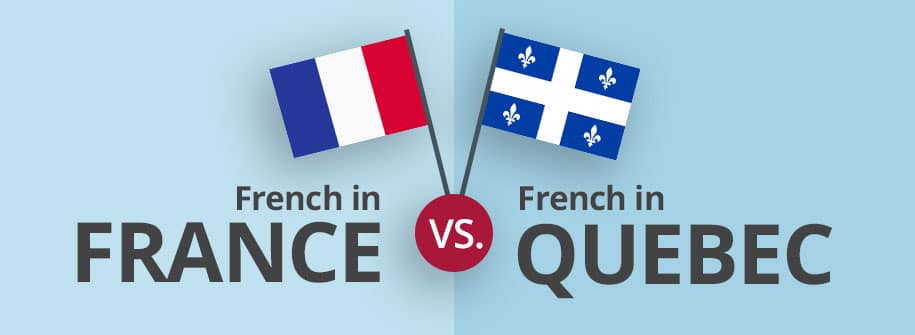The differences between European French and North American French, particularly Quebec French, are often funny and, at times, surprising. Subject, level of language and medium are just some of the factors that play into these variations. In some formal or corporate communications, they may be barely perceptible. Meanwhile, in informal language, especially in speech, these varieties of French can seem like two completely different languages.
For both populations, the contrasts in their accents and expressions are often good for a lighthearted chuckle; however, it’s not always a barrel of laughs. Certain characteristics carry a deeper cultural meaning and sense of identity. Understanding these nuances and taking them seriously matters. These considerations have an impact on the effectiveness of your communications with specific audiences in Quebec and France. To avoid negative reactions that could tarnish your brand image, it’s best to get a good handle on the differences and adapt your content accordingly. Let’s take a look at some funny, and some not-so-funny, examples of where European and Quebec French diverge.

Laughs and gasps
Accent and pronunciation are surely what sets the two varieties apart most. People who travel or move to Quebec from France may be surprised to hear Wéyons donc! instead of Voyons donc! (“Are you kidding me?”), or Enweille donc! instead of Allez allez! (“Come on!”) when being eagerly invited or impatiently pressed to go somewhere or do something. Conversely, Quebecers sometimes think that European French sounds pretentious—the kind of French that’s fit for classical theatre and not real life. They even have a term for it: parler pointu. There’s quite a difference, for example, between the European Qu’étudies-tu? and the markedly Québécois Quess t’étudies? for “What are you studying?”
Some unique word choices and turns of phrase can also be amusing. For one thing, the vocabulary has evolved differently in North America and Europe. In Quebec, mosquitos are maringouins, not moustiques like in France. Blueberries are bleuets and watermelon is melon d’eau in Quebec, but they’re called myrtilles and pastèque on the other side of the Atlantic. Stuffed animals are toutous in Canada, not peluches. And if you stumble in Quebec, it’s often s’enfarger, not trébucher.
Sometimes the same word can be used in Quebec and France but with different connotations, which can be as funny as it can be tricky. For example, if a person says they’re bourré(e) in Quebec, it means they’ve eaten too much. In France, it means they’ve had too much to drink. Then there’s the matter of mitaines. In France, they’re fingerless gloves. You wouldn’t want to be caught out with those in Quebec winter weather! Instead, moufles is the equivalent for what French Canadians call mitaines (mitts or mittens).
Of course, Quebec French is also known for its sacres, or religious curse words rooted in Catholicism. With a seemingly endless list of intriguing and creative combinations, these profanities never cease to amuse!
Another major phenomenon is the significant divergence in how English has influenced French on either continent. In Quebec, anglicisms are heavily used. Some English words are used and pronounced as in English (such as chum, joke, fun, and even dude). Others have taken on French pronunciation (parté for party) or structure (for instance, the long list of verbs like switcher, focusser or flusher).
Sometimes, an existing French word is misused in a way that reflects English usage: a person being dédiée instead of dévouée (dedicated person), a customer being éligible instead of admissible (eligible customer), being familier avec quelque chose instead of connaître quelque chose (being familiar with something), or être confortable avec quelque chose instead of être à l’aise avec quelque chose (being comfortable with something). Beyond individual words, phrases with a structure modelled on English are quite common: appliquer pour une position instead of postuler un emploi (apply for a position) or les gens que j’ai parlé avec instead of les personnes avec qui j’ai parlé (the people I spoke with) are just two of many examples. Anglicisms are somewhat insidious in Quebec, in that we may use them without realizing they’re anglicisms at all.
In France, the English influence has evolved differently. English words are often borrowed when a French word exists for the same concept. For example, the French say un mail (not courriel, for email), une startup (entreprise en démarrage), un smartphone (téléphone intelligent), faire du shopping (faire des courses, for shopping), and even faire du business (faire des affaires, for doing business). These terms are heard more often in France French than in Quebec French. For instance, people will say chartère for charter flight or trillère (sometimes even srillère) for thriller.

Not so funny
Though many differences between Quebec French and France French give us a good chuckle, there are some that need to be taken more seriously.
In France, English words are generally thrown in to sound trendy (or très cool) or more original. Nonetheless, there are certainly people who are annoyed or worried (notably at the Académie française, a long-standing council for the preservation of French language) when they see, for example, French car manufacturers using English-only slogans. For the moment, though, it doesn’t seem to be an existential threat.
Things are different in Quebec, where the French-speaking population has been a minority for centuries in Canada and throughout North America. Protecting the French language has become a matter of identity, if not a matter of survival. This explains the adoption of the Charter of the French Language (Bill 101) in 1977, and its reinforcement in 2022 with the Act respecting French, the official and common language of Québec (Bill 96). These laws establish a legal and regulatory framework for francization throughout the province.
Part of what makes Quebec’s francization efforts unique is the focus on terminology, and that includes words used in everyday life as well as in specialized fields. The francization of terminology is done using a two-pronged approach:
1. Existing terms
Promoting French terms that already exist, but that many people don’t know or use. When talking about your car, for example, anglicisms like steering, brake and bumper often prevail over their French equivalents.
2. New terms
Creating French equivalents for the thousands of new English terms that emerge each year, the realm of IT and social media being a prime example (“cloud computing,” “deepfake,” “metaverse,” “blockchain,” and the list goes on). Just think of all the essential medical terms that have had to be translated into French since the beginning of the pandemic for public safety reasons.
With such an intense focus on the francization of terminology in Quebec for the last few decades, people now react negatively to French content (original or translated) that uses English terminology. In playful, informal communications, English terms may be used precisely to get a laugh, but because of identity‑related considerations, this doesn’t occur in more formal or serious content.
The French may consider Quebec’s extensive francization of terminology to be excessive. In fact, using some terms created in Quebec may draw blank stares in France: if you were to say vol nolisé for what a European calls a chartère (charter flight), for example. Over there, people generally expect to see English terminology in French content. Many would even be annoyed if these terms were replaced by French—especially Quebec French—equivalents that they never use.

Embrace the differences in your translations
If your company’s communicating with audiences in Quebec and France, it must consider the differences in how people express themselves. Not respecting these differences can make your messages hard to understand, if not irritating. As with any other language, there’s rarely a single French translation that’s effective and acceptable in every market in the world.
A good translation agency will ask you up front who the target audience is for each of your projects. Its specialists are there to assess the context and objectives of each project in order to recommend the right strategy to deliver the highest quality at the best possible cost.
Three strategies
1. Offer a different translation for each market
Do a translation for Quebec and another for France. Entrust each one to linguists who are in the target market and know it inside out. This is the ideal approach, especially if you’re working with an agency that gives you access to language experts from both continents.
2. Adapt an existing translation for the second market
Start with a translation tailored for a Quebec audience and adapt it to France French, or vice versa. Depending on nature of the content and desired language level, it’s best to adapt at least the general vocabulary and terminology, or go further by adapting phrases and expressions. When it requires extensive and complex editing, this approach may be pricier and less effective for the target audience than having two separate translations done. In this case, your agency should provide you with a thorough assessment with clear figures and guidance.
3. Do a single translation in international French
Have just one translation done for Quebec and France, taking into account both target audiences to the extent possible. But keep in mind that so-called international French is a rather artificial language. It strips the content of its regional and cultural touch that allows the target audience to identify with an organization and its message. At best, it may be suitable for neutral corporate content. But in marketing, for example, international French is not effective. Again, you must be able to count on the professionals from your translation agency to properly assess your needs and steer you in the right direction.

Choose Versacom to make the right decisions
Whether your target audiences are in Quebec or France, Versacom has all the resources you need to make the best choices for your French translation projects. Versacom was established in Quebec and has been headquartered there for the three decades since. We have a deep understanding of the linguistic and legal landscape of Quebec and its impact on translation. In addition, we have linguists and project managers from France on staff, as well as a reliable network of partners in France. We have the dual perspective and expertise to help you succeed in every market and situation, at the best price.

